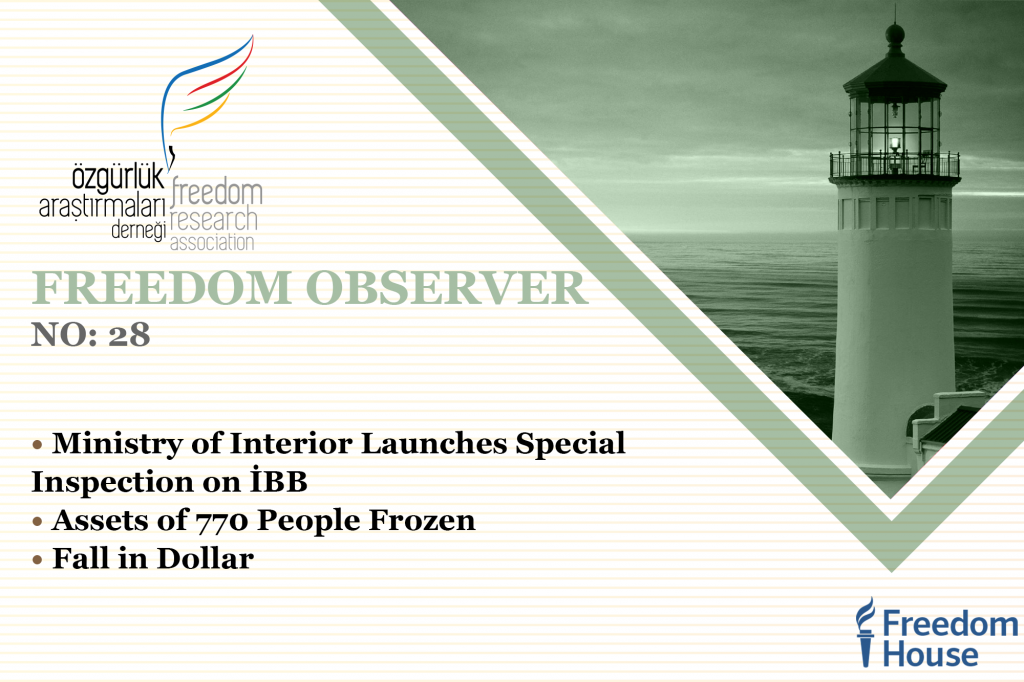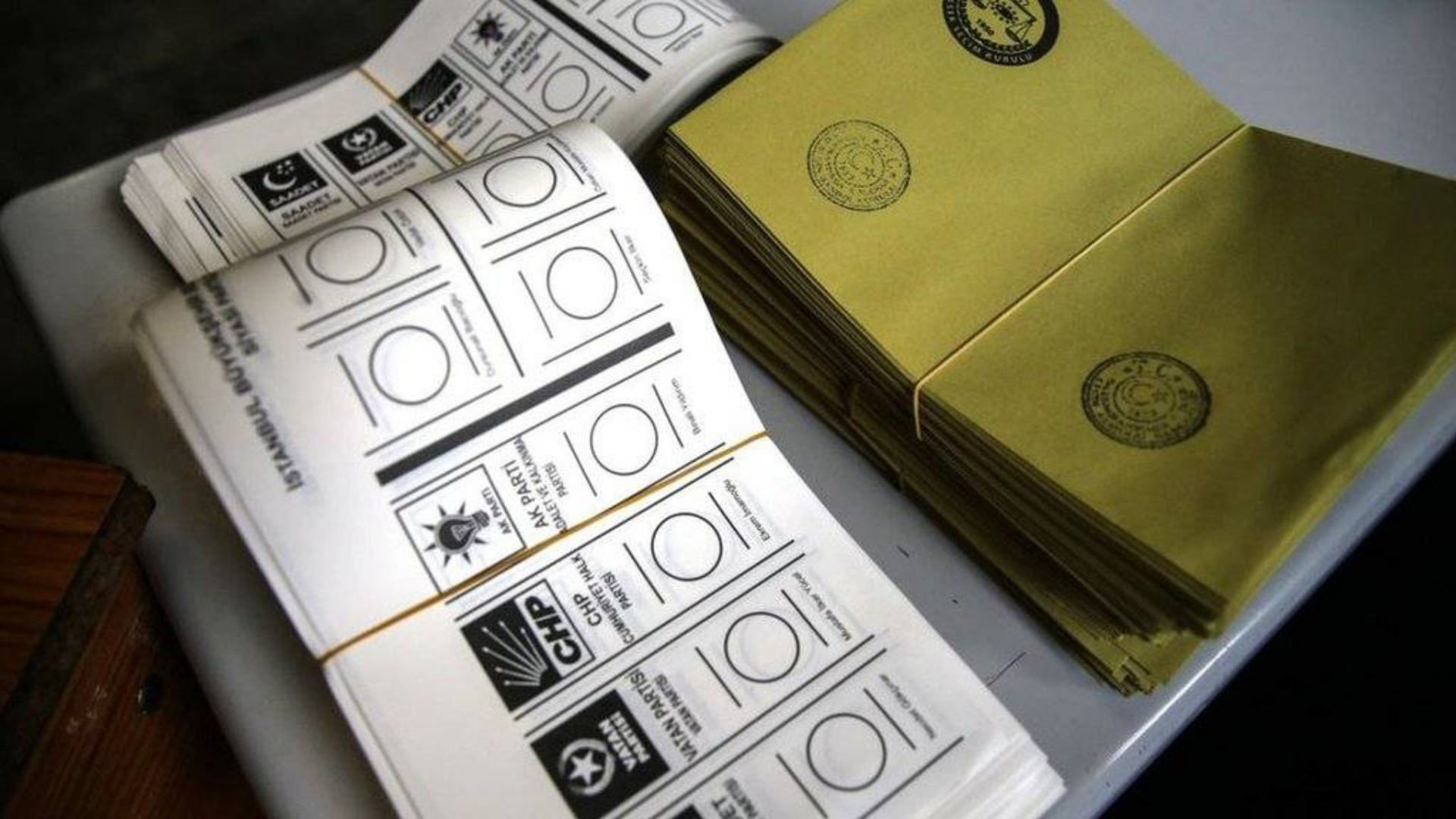
From Editor-in-Chief
New Year’s Eve is the day when people are generally the most optimistic about the future in almost every part of the world. In Turkey, in the last week of the year, the society enters into an atmosphere of calm and relaxation; hopes for the coming new year to make people more gentle, peaceful, and understanding. In politics such a period, albeit a temporary one, is expected and it is hoped that the tension in political competition will cool down to some extent, the tension between the government and the opposition will soften and the conflicts between the parties will decrease.
In these days when we are on the edge of a new year, one cannot say that the politics, which is experiencing a temporary softening, fully meets these optimistic expectations. As a matter of fact, the Ministry of Interior’s announcement that it would initiate a special inspection of the Istanbul Metropolitan Municipality (İBB), which is under the control of the main opposition party CHP, was the most glaring strange development of the last week in politics. With this special inspection, the Ministry hoped to uncover a total of 455 “terrorists” working in İBB. In response to this move of the Ministry, İBB Mayor İmamoğlu made a statement that the recruitment in the Municipality is based on the criminal record records given by the Ministry of Justice and that the Ministry of Interior did not respond to the call to inform them of the identities of these people, and that the Ministry did not take any action against these people.
Considering the practice of appointing “trustees” and punishing municipalities under the control of opposition parties through similar means, this latest move by the AKP government is not at all surprising. In addition, it should not be forgotten that the AKP administration has an “unfinished business” with the Istanbul Metropolitan Municipality – and Ankara Metropolitan Municipality as well. As it will be remembered, AKP, which had previously held the administration of İBB for many years, could not accept the failure in 2019 election won by CHP candidate İmamoğlu, albeit by a narrow margin, and thus ensured the renewal of the election, but this time it faced a greater defeat.
It seems that this latest move of the government is a new and impudent manifestation of the AKP government. Hopefully, this meddling of the Ministry of Interior will not be the first stage of the AKP administration’s plan to retake the control of the Istanbul Metropolitan Municipality through inappropriate and undemocratic means, such as appointing trustees.
Another important event that coincided with the New Year’s Eve was the freezing of the assets of nearly eight hundred legal and real persons from all sides of the ideological spectrum, with the joint decision of the Ministry of Treasury and Finance and the Ministry of Interior, on the grounds that they financed terrorism. As can be expected, it is not possible to obtain information from this administrative decision about whether there is a solid concrete and legal basis for this savage intervention to the constitutional property rights of nearly 800 people. This “high-handed” method renders the legal control over such decisions extremely difficult. This decision also constitutes a new example of the confiscation tradition that manifests itself in the form of arbitrary interference of the state’s in the property right in Turkey. Through such unjustified arbitrary decisions, we have learned once again that there is no guarantee of the right to property of people who oppose the state or the government.
We have known for a long time that freedom of expression and press freedom in Turkey have been shattered dramatically. However, the latest news about the denunciation of the economic commentators by the Banking Regulation and Supervision Agency (BDDK) does not leave much to say on this issue. The reason for the criminal complaint against a total of 26 people, including two former Central Bank Governors, is that these people made “posts to manipulate exchange rate movements through social media and publications”. Thus, making evaluations and predictions about the government’s economic policies that are not pleasing to those in power are among the new types of crimes invented by the AKP government. In other words, as in other matters, it is understood that citizens do not have a democratic right to have an opinion on the government’s economic and financial policies. On the contrary, it is at the forefront of the AKP administration’s rather strange list of crimes. Since the AKP still has not given up on its claim on democracy, this must be one of the ways AKP-style “democracy” manifests itself!
Indeed, while all this is going on, the main agenda in the background continues to exist. As you know, when the interest and exchange rate policy followed by the government brought the price of the dollar closer to 20 TL, the government again reduced the exchange rate to 12 TL by selling dollars, and promised a currency guarantee for depositors whose interest rate was below the dollar’s price. However, it is unclear how long the temporary relief from this move will last. If DEVA Party’s chairman’s, Ali Babacan, diagnosis that this move of the government can only create a “false spring” atmosphere is correct, the government must be planning to hold an early election next year. This suggests that the AKP administration is seeking an early election rather than a permanent recovery of the economy.
Regardless, we wish you all a happy new year.
Ministry of Interior Launches Special Inspection on İBB
The AKP government, which lost many metropolitan and district municipalities in the 31 March 2019 local elections, started targeting the municipalities that the opposition parties won. The government, which appoints trustees to hundreds of municipalities won by HDP, continues to put pressure on CHP municipalities through various means. It exhibits a repressive attitude towards opposition municipalities in a wide range method from creating administrative difficulties to restricting resources, from preventing mutual aid projects to media campaigns. This week, there has been a new development in which the government has increased the pressure, let alone reducing it.
In a statement published on its social media account, the Ministry of Interior announced that a special inspection was launched to investigate the allegations that Istanbul Metropolitan Municipality personnel were involved in terrorist organizations. The statement said, “Of the personnel recruited in Istanbul Metropolitan Municipality and its companies, 455 are affiliated with PKK/KCK, 80 with DHKP/C, 20 with MLKP, 2 with MKP, and some with FETÖ and other terrorist organizations. A special inspection has been initiated by the Ministry to investigate the matter in all aspects, upon notices, complaints and findings obtained”.[1] In addition, The Minister of Interior, Süleyman Soylu, said in a statement that they had accessed some information and received notices about İBB while working on the Religious Scholars Assistance and Solidarity Association (DİAYDER).[2]
In his statement, İBB Mayor Ekrem İmamoğlu said that a criminal record from the Ministry of Justice is requested for recruitment in the municipality so that people whose crime has been determined by the court are not admitted to the İBB. Stating that Soylu made this claim two weeks ago, Ekrem İmamoğlu wrote to the Ministry and said that it is necessary to share who these people are, adding that the Ministry of Interior did not share any explanation on the subject. İmamoğlu also drew attention to the fact that if there are people involved in terrorism, action should have been initiated immediately, but the Ministry did not take any action.[3]
It is clear that the allegations of recruiting people with ties to terrorism in İBB are aimed at targeting Imamoglu, who is a potential candidate for the upcoming presidential election rather than pointing out to a concrete suspicion. As a matter of fact, the statement made by Tevfik Göksu, who is the AKP Group Chairman of the Istanbul Metropolitan Municipality Council, “I do not have data, the Ministry named those who spoke in the corridors”, shows that the allegations are far-fetched.[4]
Assets of 770 People Frozen
With the decision published in the Official Gazette dated 24 December 2021[5], it was decided to freeze the assets of 770 real and one legal person in Turkey on the grounds that they were members of various terrorist organizations based on Article No. 7 of the Law No. 6415 on the Prevention of the Financing of Terrorism.
According to the decision, these people’s assets were frozen on the grounds that they were members of the organizations in that 454 real and one legal persons have “membership of FETÖ/PDY”, and 108 of PKK/KCK”; 119 people are members of terrorist organizations such as Hezbollah, ISIS, Al-Qaeda, Al Nusra, Islamic Movement Organization and the Quds Army, which are described as organizations that exploit religion, and 89 people are members of left-wing organizations such as MLKP, TKM/ML, DHKP-C, MKP, DKP/BÖG, DEV-KAR and THKP-C. It is understood that all of those whose assets were frozen are abroad, among them former public officials, judges and prosecutors, academics, and journalists.
According to the third paragraph of the Law No. 6415 added to the Article 7 by the Law No. 7262, after the courts have definitively decided that it is a terrorist organization, the Minister of Treasury and Finance and the Minister of Interior may freeze the assets of individuals, institutions, or organizations in Turkey through a joint decision based on the existence of reasonable grounds for providing funds to these organizations and committing the crimes of financing terrorism.
As it is clear from the Law that in order to freeze assets in accordance with the provisions of the Law, there must be reasonable grounds for funding the organizations that are definitively determined to be a terrorist organization by the courts and that the crime of financing terrorism has been committed. Terrorist crimes specified in the Law are mainly accepted as acts of terrorism in various international conventions, such as hijacking, threatening the security of civil aviation, hijacking sea vessels, bombing, threatening diplomats, taking hostages, and threatening the security of nuclear materials, which are universally accepted as terrorist acts. However, the acts considered as terrorist crimes within the scope of Law No. 3713 are also included within the scope of Law No. 6415. However, in order to be able to determine the financing crime, it is necessary to provide financial resources for the committing of terrorist acts.
In the decision published in the Official Gazette, there was no information about what evidence was found about these people. With reference only to Articles 3 and 4 of the Law, it is mentioned that there are reasonable grounds for committing the acts specified in these articles. It is clear that the implementation of the Law in this way will cause serious problems in terms of predictability. Such unpredictable practices also threaten the right to private property.
On the other hand, in the decision published in the Official Gazette, it was stated that an objection could be made to the Ankara Heavy Penal Court. However, according to the Law, the decision must be submitted to the judge’s approval within 48 hours. Whether it is submitted to the approval of the judiciary by the executive or examined by the judiciary upon the objection of the concerned, the said examination must be based on concrete evidence. When a list of 700 different people is decided to commit such acts, the fact that these decisions are not individualized is a serious problem and makes legal control impossible.
However, the measure brought about for a serious restriction on fundamental rights must be transparent and auditable in terms of procedure and comply with human rights guarantees in terms of content. Freezing the assets of individuals by administrative decisions without any judicial decision will violate the fundamental rights of the persons concerned, and the unpredictability caused by these decisions weakens the investment environment of the country.
Fall in Dollar
The economy is heading towards a strange land in Turkey. It is, indeed, hard to make sense of what has been done in the economy. In the previous bulletin, we noted that the dollar was around 15 TL. Then the dollar rose to 18 TL and the euro to around 23 TL. Currently, the dollar is oscillating around 12 TL. What caused this was President Erdogan’s announcement that the government introduced a new economic policy called Foreign Currency Indexed Deposits (DEM). Since it would take too long to explain this subject in detail, it would be useful to summarize it.
People in Turkey prefer to keep their savings in developed country currencies in order not to be affected by the depreciation of the Turkish lira caused by the economic turmoil experienced in recent years. This causes the majority of deposits to be held in foreign currencies such as US dollar and Euro. After the CBRT started to cut interest rates recently, the depreciation of the Turkish lira accelerated. As a result, the dollarization process accelerated. Erdogan also announced that the government introduced the DEM to prevent this situation. It was stated that the losses caused by the foreign exchange increase of those who exchanged their foreign currency for the DEM product or deposited money will be covered by the Treasury and the CBRT. This caused a rapid decline in the dollar. However, this is only one aspect of the DEM. The ratio of foreign currency deposit accounts to all deposits is at historic level these days. After the announcement of this product, the foreign exchange purchase of individuals increased considerably. In other words, the DEM could not make people to see TL as safe harbor. In fact, with the introduction of DEM, this function has been eroded even more.
The constant interest rate cute with a logic blended with religious motivations is the most striking example of a group’s imposition of their religious belief on the entire society. The fact that the ruling power tries to impose its religious view in such a daring and striking way results in the disappearance of individual freedoms, especially economic freedoms. Some people may object to what I have said and claim that this is not a religious imposition but just a pragmatist move of the government. They are, in fact, partially right. There is always an excuse for the oppression of freedoms. No group or person holding the power of power will openly embark upon oppressing one’s right to freedom, welfare, and property. The governments may find an excuse and argue that steps have been taken for the well-being of “all of us” and the “nation”. I think it is not an exaggeration to claim that the excuse for all this economic turmoil is religious reasons. In fact, the government itself does not deny it. As a matter of fact, Erdogan said at the AKP group meeting on November 17, “we will lift the scourge of interest from this nation. We certainly cannot oppress our nation to interest. We will not accept this. Those who still stand up and defend interest among our friends with whom we walk on this road and this struggle are not with us any longer. On this path, I cannot be with those who support interest.”[6] Here, Erdogan explains that the laws set by God forbids interest, and that he and his friends look at the issue from a religious perspective, so they decided to cut interest rates. In other words, what lies behind the government’s rather strange stance on interest rates stems from religious reasons.
[1]https://www.dunya.com/gundem/imamoglu-icisleri-bakanligi-yanlis-yere-sorusturma-aciyor-haberi-644120
[2] https://www.bbc.com/turkce/haberler-turkiye-59798529
[3] https://www.bbc.com/turkce/haberler-turkiye-59798529
[4] https://tele1.com.tr/akpli-goksudan-ibbye-teror-teftisi-degerlendirmesi-elimizde-data-yok-ama-belediye-koridorlarinda-konusulanlar-var-533978/
[5] https://www.resmigazete.gov.tr/eskiler/2021/12/20211224-16.pdf
[6]https://www.karar.com/guncel-haberler/son-dakika-erdogandan-grup-toplantisinda-kritik-aciklamalar-1639765






